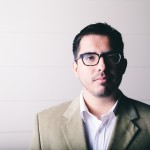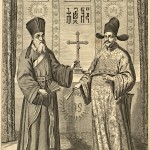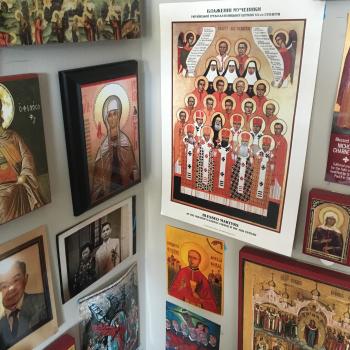![Saint Basil's Cathedral. Moscow, Russia, 25 September 2005 - by EugeneZelenko's brother, Alex Zelenko ( Russia-Moscow-Saint_Basils_Cathedral-2.jpg) [CC BY-SA 4.0 (https://creativecommons.org/licenses/by-sa/4.0/)], via Wikimedia Commons](https://wp-media.patheos.com/blogs/sites/721/2016/08/Russia-Moscow-Saint_Basils_Cathedral-2-1024x766.jpg)
Russia-Moscow-Saint_Basils_Cathedral-2.jpg) [CC BY-SA 4.0 (https://creativecommons.org/licenses/by-sa/4.0/)], via Wikimedia Commons
Within and among each of these churches, there is a range of ideology. I am told that some who are in communion with the Moscow Patriarchate think that it’s sheer destructive madness that Russia should be able to freely exert its cultural – and therefore geopolitical – influence across internationally-established borders with the Moscow Patriarchate as the ‘gatherer of Russian lands’ (as the interviewer puts), such as in the case of Russia annexing Crimea in 2014 (which is actually Ukraine) and sending its troops to Donbas (which is also Ukraine). I am also told that there are others across the churches who feel more sympathetic to these expansionist ambitions, whether these churches are in communion or not (and even some Protestants and Latin Catholics – often the latter have some crazy interpretation of the Fátima apparition, which means I’ll also eventually get to Fátima someday on this blog). Of course, the ‘Russian World’ is usually not put so starkly; it’s more typically about promoting Russian as a language and forming a cultural bloc in ‘Eurasia’ as a viable alternative to the decadence of modern Western culture (read: in the European Union and the United States) – and lately, as I’ll get to at the very end, protecting persecuted Christians in the Middle East – and this ideology needs Russian Orthodoxy to work because that’s what’s supposed to give this new cultural geography its moral oomph. However, what then becomes inconvenient for the sovereign state of Ukraine is that the ‘Russian World’ also somehow involves them being part of Russia even though they’re not and actually by and large want to be part of the European Union, and that’s especially dicey for my church because in a ‘Russian World’ ideology, Orthodox-in-communion-with-Rome folks are not supposed to exist because that would make us part of the West, even though we call ourselves Eastern Catholic.
Some people across these churches (and other churches) hold to this Russian World ideology, and others reject it, but ideology is tricky this way – it comes from institutions, but wiggles its way outside of institutional borders such that the persons it influences do not always correspond neatly to whether they belong to this group or the other group. Archbishop Job calls foul on the ideology; the persons to whom his calling foul applies is an open question. The proof of this, for example, is that one of the interlocutors I’ll be bringing in to help me understand Archbishop Job sympathetically is Sr Dr Vassa Larin, a ROCOR nun who is in communion with Moscow and runs a very popular YouTube channel called Coffee with Sister Vassa. When she is not making YouTube videos and new podcasts for her Patreon subscribers (the ‘zillions,’ as she calls us), she produces dynamite scholarship on liturgy and (especially relevant to my purposes here) the Orthodox canons. (By this you will know why I’m not sending this to a real journal – I don’t think you can cite Coffee with Sister Vassa videos in a journal article!) But all that’s to say is that I’m sincere when I say that Archbishop Job understands the range of ideologies in these various churches, not least because he used to be the Exarch of the Paris Exarchate.
The context for Archbishop Job’s discussion of Russian World ideology is, oddly enough, the ‘pan-Orthodox’ status of the Holy and Great Council in June, given that four Orthodox churches, including the Russians, pulled out of it at the last minute. Planned for over 55 years, the Holy and Great Council was supposed to have been a gathering of all the Orthodox Churches (hence, ‘pan-Orthodox’) to sort out a number of issues that have arisen over centuries of not meeting together like this, especially in their canons. After everything was all set to go for 19-26 June 2016, four churches, including Moscow, pulled out in June. In fact, the reason that the Moscow Patriarchate gave at the time it was pulling out was that because Bulgaria, Antioch, and Georgia weren’t attending, the council itself should be postponed, as they held that the non-participation of some churches would render its status as ‘pan-Orthodox’ questionable; this was also its position after the council.
When the interviewer asks Archbishop Job about this, he begins with the standard line that the Ecumenical Patriarchate has given through Archdeacon John Chryssavgis – these churches all previously signed off on the documents for the council and were all part of the preparation process. While Chryssavgis’s statement is doubtful when it comes to Antioch (which did not attend because of a turf war they’re having with Jerusalem over Qatar and did not sign off on the documents), Archbishop Job’s comments are focused on Moscow’s surprising pull-out:
They refused at the last moment, while they were involved in its preparation, they signed documents that had been prepared, they even took part in organizational meetings a month before the Council. And the Russian Orthodox Church was present even a week before the Council at the meeting of the Committee to prepare its message to the Council. They decided not to participate in the Council right at the last moment.
What does this mean for the Council’s ‘pan-Orthodox’ status? Not much, Archbishop Job seems to say, and that’s because – as the interviewer extracts from his answer – ‘participation and reception are two parallel concepts, not necessarily related to each other.’
Here is where things get interesting. Of course, the need for a council to be received (not just to have its decisions proclaimed, as in the Latin Church) in order to grant it ‘ecumenical’ status is not very interesting; that’s just how things are done by Byzantines.
What’s interesting is where Archbishop Job goes with this. The first thing he talks about is: what happens if all the churches participate in a council except yours? This, he points out, is what happened with Armenia in the fifth century:
But from history we know there were the Churches that refused to participate in some councils. And since they refused to participate in the councils, they remained outside the Church. Well, for example, the Armenian Church rejected the Fourth Ecumenical Council of Chalcedon in the V century, because it thought that the problem of Monophysitism is an internal problem of the Church of Constantinople and it was not relevant for it. There were also political issues associated with this stance. But now the Armenian Church is not in the communion with universal Orthodoxy. It is one of the non-Chalcedonian Churches that for centuries has remained beyond the universal Church.
What Archbishop Job seems to be implying is that what is at stake is not whether or not the Council was pan-Orthodox, but whether the churches that failed to participate are themselves even Orthodox. After all, if this council’s decisions are indeed received by the Orthodox Churches regardless of whether they all participated, that’s what will make it pan-Orthodox, which means that those who do not receive this council may find themselves cut off from Orthodoxy.
If that isn’t radical enough, it gets even more so still. The interviewer tries to nudge Archbishop Job on this point, as Moscow’s claim to Orthodox fame is that it is the largest autocephalous Orthodox Church in terms of sheer numbers. Archbishop Job’s response is basically that the number of people adhering to an ideology doesn’t really matter if the ideology is flawed to begin with. This is where he begins to take apart the ideology of the ‘Russian World’ – not only as it has been propagated by Putin’s regime (including and especially the Moscow Patriarchate) to invade Ukraine (among other places), but all the way back to the raison d’être of Moscow’s own autocephaly:
The myth of “Moscow the Third Rome” rests on the opinions expressed by Philotheus, a Russian monk who lived in the XV-XVI centuries. This is an absolute myth, because in the history of the Church and in the canonical sense there is no first, second, third or fourth Rome. There was the old Rome, which was the center of the Roman Empire, the center of European civilization, and there was the new Rome — the new capital of the Roman Empire. There is no first or second Rome but there are the old and the new ones. There will be no third, fourth and fifth Romes either.
And this is not only the history of the Church, not only the history of the empire – it is a history of human civilization. The Churches of Rome and Constantinople today contain the legacy of these two Churches. They are the heirs of their political, ecclesial, human history, and they enjoy canonical grounds and privileges related thereto. (Emphasis mine.)
A cursory look at my pdf copy of the Pedalion (‘everybody’s favourite book!’ as Sister Dr Vassa Larin quips) tells me that Archbishop Job is referring to several canons here. Canon 3 of the Second Ecumenical Council at Constantinople in 381 says: ‘Let the Bishop of Constantinople, however, have the priorities of honor after the Bishop of Rome, because of its being New Rome.’ Canon 28 of the Fourth Ecumenical Council at Chalcedon in 451 states, and I quote in full:
Everywhere following the decrees of the Holy Fathers, and aware of the recently recognized Canon of the one hundred and fifth most God-beloved Beishops who convened during the reign of Theodosius the Great of pious memory, who became emperor in the imperial city of Constantinople otherwise known as New Rome; we too decree and vote the same things in regard to the privileges and priorities of the most holy Church of that same Constantinople and New Rome. And this is in keeping with the fact that the Fathers naturally enough granted the priorities to the throne of Old Rome on account of her being the imperial capital. And motivated by the same object and aim the one hundred and fifth most God-beloved Bishops have accorded the like priorities to the most holy throne of New Rome, with good reason deeming that the city which is the seat of an empire, and of a senate, and is equal to old imperial Rome in respect of other privileges and priorities, should be magnified also as she is in respect of ecclesiastical affairs, as coming next after her, or as being second to her. And it is arranged so that only the Metropolitans of the Pontic, Asian, and Thracian dioceses shall be ordained by the most holy throne of the most holy Church of Constantinople aforesaid, and likewise the Bishops of the aforesaid dioceses which are situated in barbarian lands; that is to say, that each Metropolitan of the aforesaid dioceses, as has been said, are to be ordained by the Archbishop of Constantinople, after the elections have first been conducted in accordance with custom, and have been reported to him. (Emphasis mine)
Canon 36 of the Sixth Ecumenical Council, also at Constantinople, but in 680, confirms this order:
Renewing the laws made by the one hundred and fifty Holy Fathers who assembled in this God-guarded imperial capital city [referencing the Second Ecumenical Council in 381], and by the six hundred and thirty of those who assembled in Chalcedon [referencing the Fourth in 451], we decree that the throne of Constantinople shall enjoy equal seniorities (or priorities) with the throne of older Rome, and in ecclesiastical matters shall be magnified like the latter, coming second after the latter; after which the throne of the great city of the Alexandrians shall come next, then that of Antioch, and after this the throne of the city of the Jerusalemites.’
Because all this talk about ‘Third Rome’ came about in the fifteenth and sixteenth centuries through the vision of a monk, ‘Third Rome’ technically does not canonically exist. In fact, taking seriously that last canon, Moscow technically comes after Constantinople, Alexandria, Antioch, and Jerusalem; it’s not Third Rome, but the ‘Fifth Patriarchate’ (if you don’t count the First Rome). It doesn’t matter how many people in the world think that Moscow is the Third Rome, and it even doesn’t matter if the Moscow Patriarchate technically has the largest amount of Orthodox Christians in its church (even though a third of this population is in Ukraine); what Archbishop Job is saying is that nobody gets to make canons up. Despite the numbers, Archbishop Job says starkly, ‘These currents are marginal, despite the number of supporters. They do not represent the position of the Church.’
And here is where Archbishop Job goes in for the kill. If we play the numbers game, he says, we must remember that at many points in church history, heretics outnumbered the Orthodox:
These currents are very dangerous and perverse. Therefore the Church as such cannot accept these marginal viewpoints. These viewpoints are not revealing the truth of the Christian faith and Christian mission.
You see, someone likes to apply the principle of numbers, and believes that the more followers there are, the more powerful or more righteous they will become. If we go back to the history of the Church, in the IV century Arians were so numerous and powerful, even such great figures of the Church as St. Gregory the Theologian, St. Basil the Great worried whether the Church would survive. But despite the number of Arianism adherents, the Church never accepted such a standpoint, since the Arian doctrine was marginal and did not correspond to the truth of the Christian faith and Christian doctrine.
Later, in times of struggle with monotheletism in the VII century, Saint Maximus the Confessor was almost the sole adherent of the Orthodox faith. Almost everyone, most people were adherents of monotheletism. But finally monotheletism was condemned by the Council and it was St. Maximus the Confessor, who, being alone with his standpoint, finally won. Therefore one should not rest any concept, theory or plan on marginal views or numbers. You need not worry about that.
A comparison with Arians and monotheletites is not flattering at all; some might even say that Archbishop Job is calling the Moscow Patriarchate’s ideology a heresy in its own right. This is a serious charge, and perhaps it is the biggest bombshell of the interview because it reveals from the mouth of a hierarch in the Ecumenical Patriarchate what Constantinople really thinks of Moscow, at least in some quarters – and perhaps the whole thing, if no qualifications come out from the Phanar on this interview. Whatever Archbishop Job is doing here, what is certain is that he is saying that the ‘Russian World’ ideology – and by extension, even the ‘Moscow as Third Rome’ ideology – is uncanonical.
But does this strict reading of Orthodox canons work? Isn’t this a form of legalism? Can you really call ‘heresy’ based on canonicity? Doesn’t Sister Vassa remind us in the same video where she makes the Pedalion joke that ‘the purpose of the canons’ is oikonomia, ‘the building up of God’s house’? Isn’t calling out the Moscow Patriarchate like this quite divisive of Archbishop Job, the very opposite of oikonomia? Read on.












